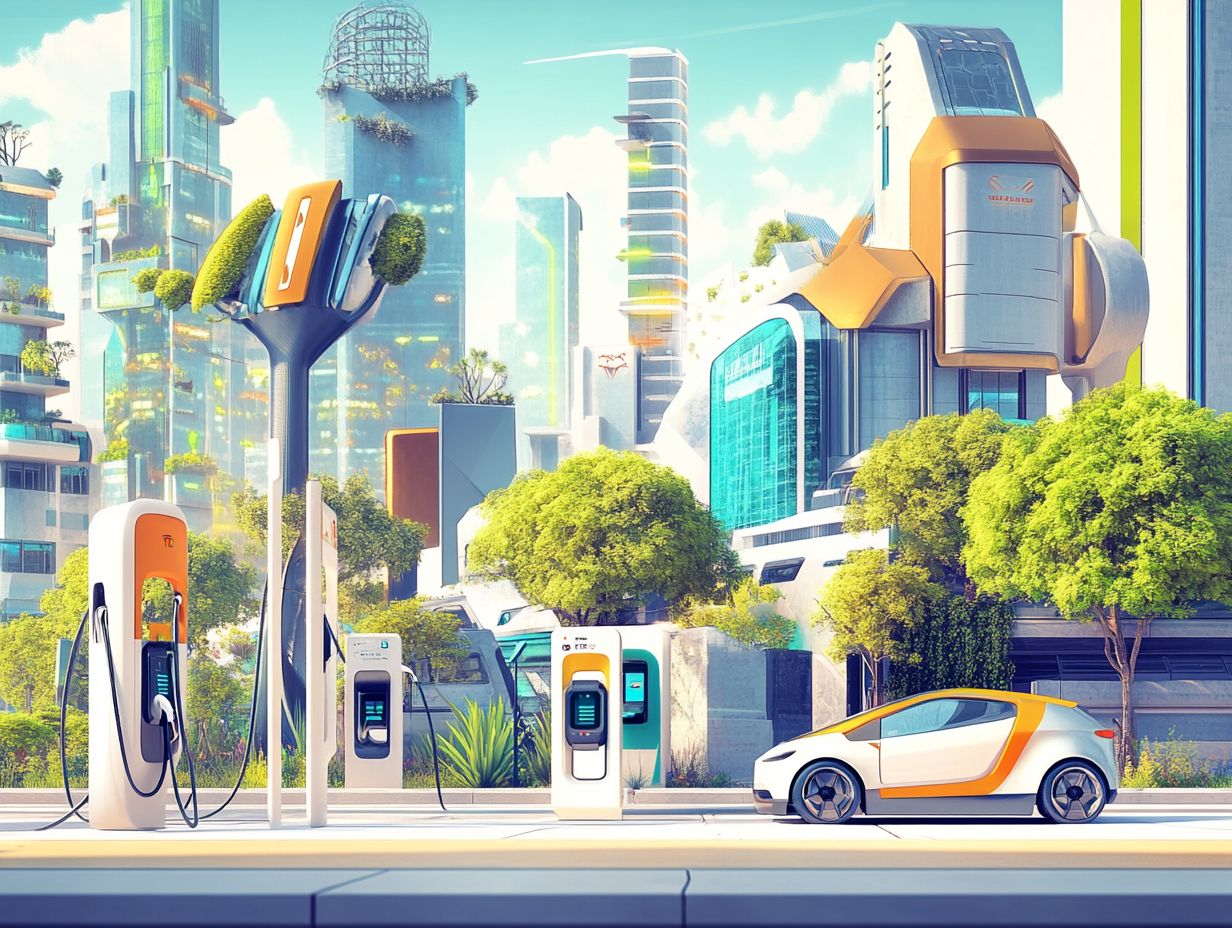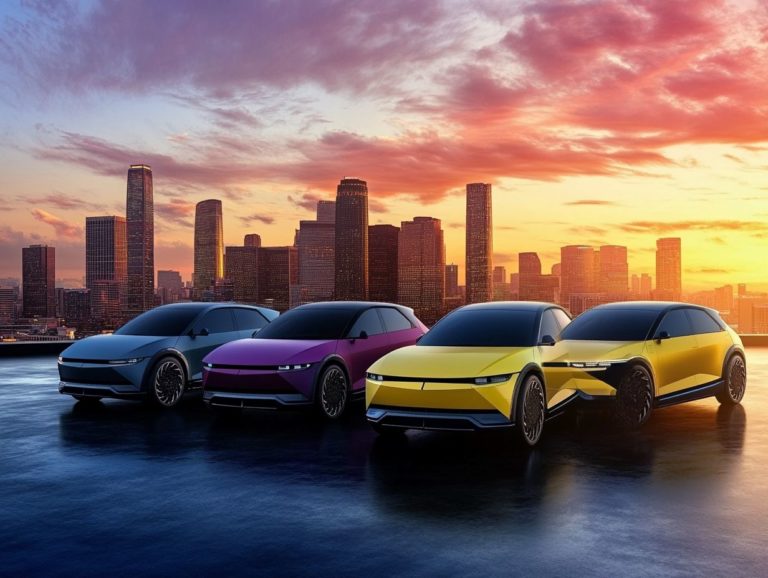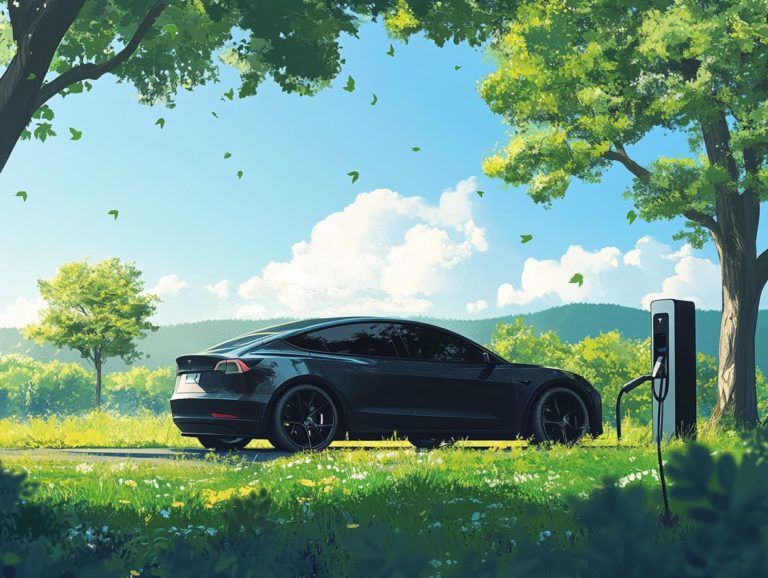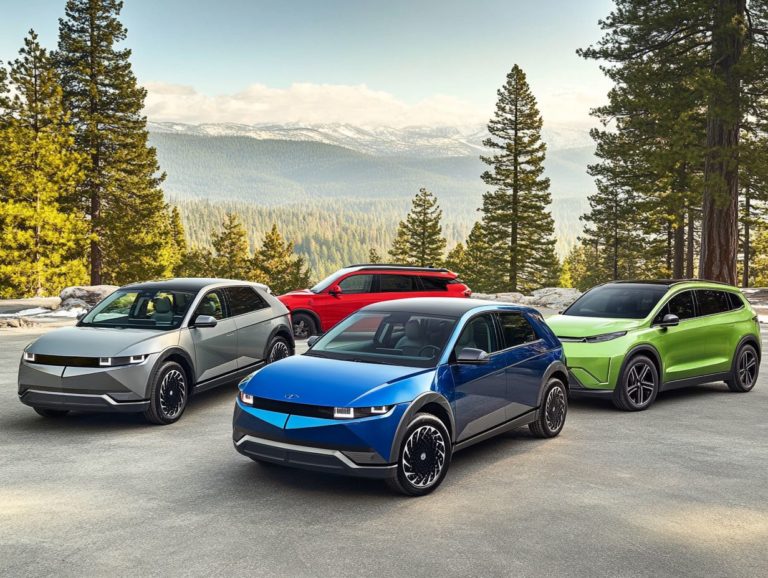electric vehicle trends to watch in the next decade
The electric vehicle market is undergoing a remarkable transformation, characterized by a surge in popularity and significant technological advancements. As you and countless others embrace greener alternatives, the landscape is evolving at an unprecedented pace.
This article delves into the current trends shaping the industry, forecasts future growth and changes, and highlights the environmental benefits of electric vehicles. It also addresses the challenges and opportunities on the horizon, along with exciting innovations that are worth keeping an eye on.
Join us as we explore the future of EVs in the coming decade!
Contents
- Key Takeaways:
- Overview of the Electric Vehicle Market
- Current Trends in Electric Vehicles
- Future Predictions for Electric Vehicles
- Environmental Impact of Electric Vehicles
- Challenges and Opportunities for Electric Vehicles
- Innovations and Developments to Watch
- Frequently Asked Questions
- What are some key trends to watch for in the electric vehicle market in the next decade?
- How will advancements in battery technology impact the electric vehicle market in the next decade?
- What role will government support and incentives play in the growth of the electric vehicle market?
- Will the prices of electric vehicles decrease in the next decade?
- What impact will the emergence of new players have on the electric vehicle market?
- What challenges may arise in the next decade for the electric vehicle market?
Key Takeaways:

The electric vehicle market is rapidly growing, with increasing popularity and adoption driven by advancements in technology. In the next decade, the electric vehicle industry is expected to continue to grow, with predictions about the future of buying electric vehicles that include significant changes and innovations.
Electric vehicles have the potential to significantly reduce carbon emissions and improve air quality, but they face challenges such as infrastructure and cost considerations.
Overview of the Electric Vehicle Market
The electric vehicle (EV) market has undergone a remarkable transformation over the last decade, showcasing a swift shift towards sustainable transportation and a reduction in carbon emissions, as highlighted in the future of electric vehicles: predictions for 2025.
Major players such as Tesla, BYD, and Volkswagen have catapulted electric car sales to unprecedented levels, fueled by advancements in battery technology and increasing investor confidence in the sector.
The rise of battery manufacturers like CATL and LG Chem has boosted production capacity.
However, concerns surrounding critical minerals and lithium extraction have sparked important conversations about creating a more resilient supply chain.
As global competition intensifies and venture capital flows into clean technology, watch as the automotive industry rapidly evolves to meet new challenges and seize exciting opportunities.
Current Trends in Electric Vehicles
The current trends in electric vehicles showcase a significant shift in the EV market, propelled by groundbreaking technological advancements and increasing consumer interest in what to expect in electric vehicle design trends.
With manufacturers such as Tesla and BYD at the forefront, they are leading the charge in electric car sales, setting the stage for a transformative future in transportation.
Increasing Popularity and Adoption
The growing popularity of electric vehicles signals a significant shift in consumer preferences, influenced by factors such as heightened environmental awareness, advancements in battery technology, and increased investor confidence in the EV market.
This remarkable trend is further enhanced by government incentives that promote eco-friendly choices, allowing you to reap substantial tax credits and rebates.
As fuel prices continue their upward trajectory, many are turning to electric alternatives as a more cost-effective solution to rising transportation costs.
The expansion of charging infrastructure has eased concerns about range anxiety, making it more convenient for you to embrace these modern vehicles.
Additionally, social media plays a pivotal role in shaping perceptions; influencers and satisfied owners enthusiastically share their positive experiences, creating a collective enthusiasm that is transforming the automotive landscape.
Advancements in Technology
Recent advancements in technology are transforming the electric vehicle landscape, particularly through breakthroughs in battery technology that have significantly enhanced production capacity and overall efficiency.
One remarkable innovation is the development of lithium-ion batteries, which provide higher energy densities and reduce charging times, directly improving vehicle performance and range.
With vehicle-to-grid technology, your electric vehicle can now send energy back to the grid, which helps to save energy and promote resilience in power consumption.
Smart charging solutions take it a step further by optimizing the charging process, allowing you to charge during off-peak hours and reducing overall costs.
Collectively, these innovations encourage consumer adoption by tackling range anxiety and charging logistics. They also play a vital role in fostering a sustainable automotive industry, minimizing reliance on fossil fuels, and contributing to a cleaner environment.
Stay tuned for more updates on the electrifying future of transportation!
Future Predictions for Electric Vehicles
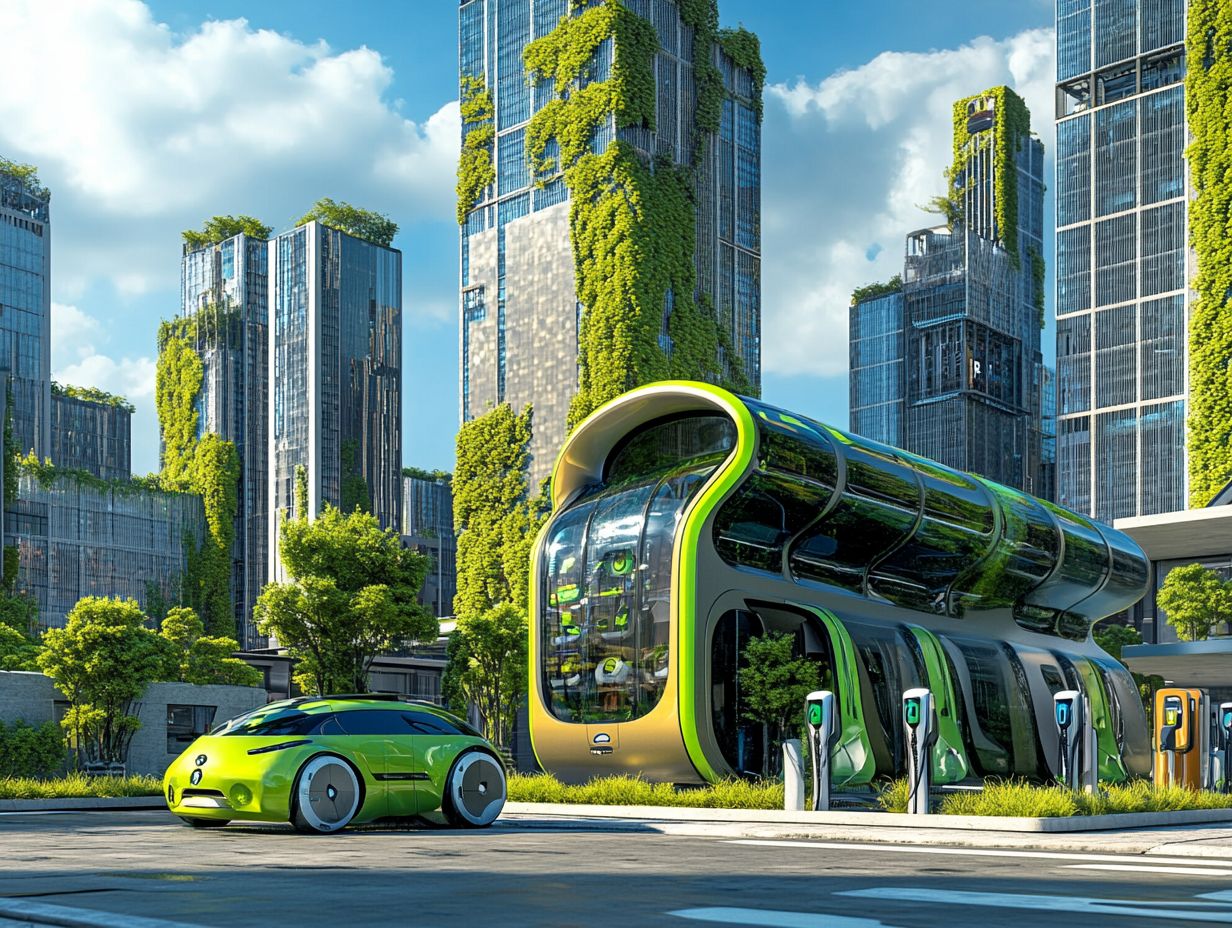
Future predictions for electric vehicles indicate a promising path for the EV market, with growth anticipated to be driven by breakthroughs in battery manufacturing, a significant rise in electric car sales, and heightened competition among top automotive brands, including insights on the rise of electric vehicle startups.
Expected Growth and Changes in the Industry
The anticipated growth and changes in the electric vehicle industry signal a transformative era. As the market grows, investors will show more interest. Start-ups will also seek funding for clean technology initiatives.
This shift not only illustrates evolving consumer preferences but also highlights a broader commitment to sustainability. Traditional automotive companies are increasingly acknowledging the necessity to pivot. They are launching their own electric models while rethinking strategies to incorporate innovative technologies.
You might witness notable mergers and acquisitions aimed at consolidating resources and expertise, enabling these companies to deftly navigate the complexities of new regulatory frameworks. Emerging players in the EV market are also challenging established norms, ramping up the competition.
Government policies are championing clean energy, and the momentum behind electric vehicles is gaining speed like never before! This opens the door to unprecedented growth opportunities.
Environmental Impact of Electric Vehicles
The environmental impact of electric vehicles is significant, as they are instrumental in reducing carbon emissions and enhancing air quality.
By embracing electric vehicles, you contribute to global initiatives aimed at achieving sustainable transportation and advancing clean technology.
Reducing Carbon Emissions and Improving Air Quality
Electric vehicles play an important role in reducing carbon emissions and enhancing air quality, offering a compelling solution to combat the detrimental effects of traditional gasoline-powered vehicles.
Their remarkable performance is underpinned by various mechanisms, especially when you consider studies examining the environmental effects of EVs from production to disposal.
By examining both direct and indirect emissions, it becomes clear that these innovative vehicles have the potential to significantly diminish overall greenhouse gas outputs.
For example, cities that have embraced electric mobility frequently report substantial improvements in air quality. A study conducted in Los Angeles, for instance, found that increased adoption of EVs led to a 10% reduction in nitrogen oxides, highlighting the vital role electric vehicles play in fostering healthier urban environments.
Challenges and Opportunities for Electric Vehicles
The electric vehicle market presents you with a unique blend of challenges and opportunities, particularly concerning infrastructure development, cost considerations, and the intricate supply chain dynamics involving battery manufacturers.
Navigating this landscape requires a keen understanding of the evolving market conditions and strategic foresight to leverage the potential that lies ahead.
Infrastructure and Cost Considerations
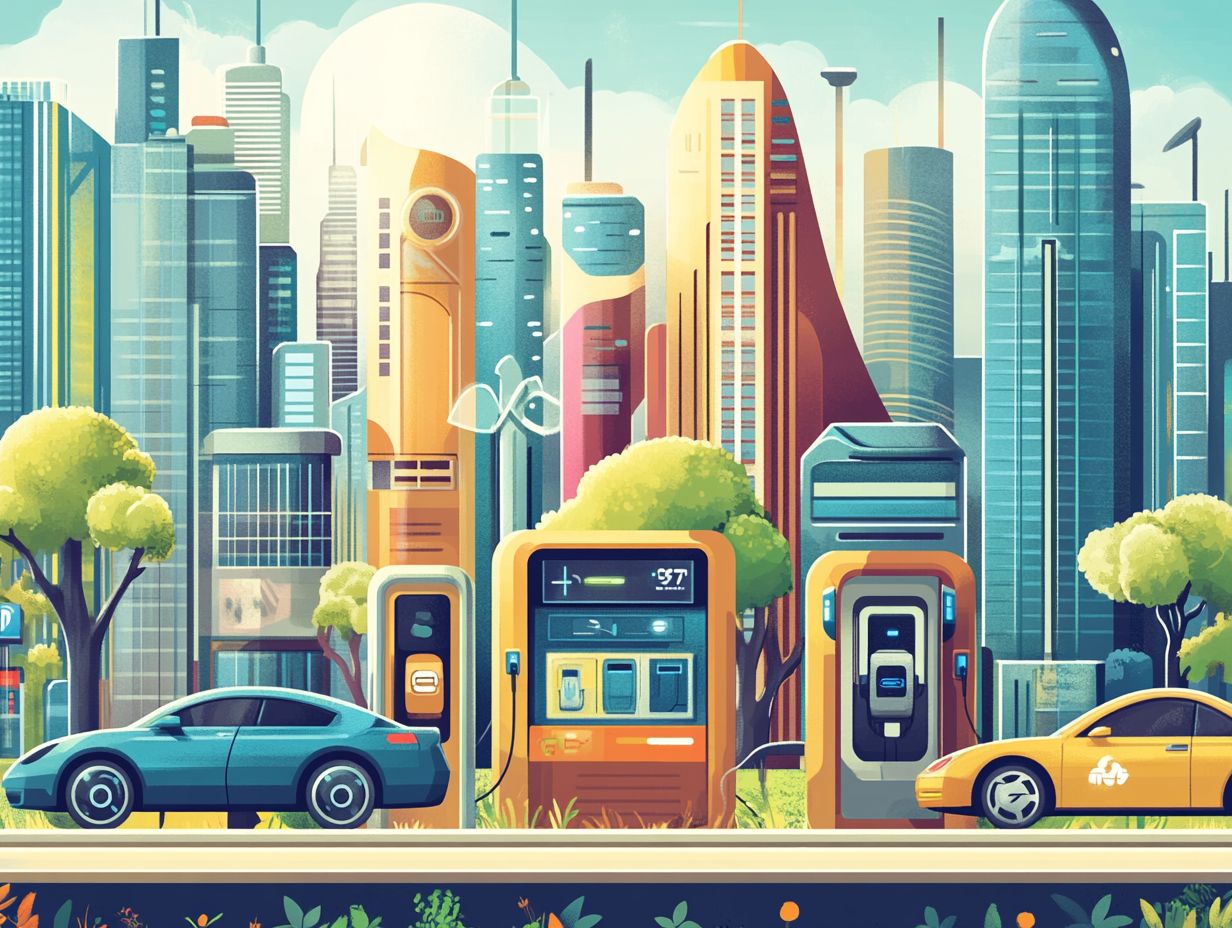
Infrastructure and cost considerations are pivotal challenges you face in the widespread adoption of electric vehicles. The development of charging networks and the upfront costs of EVs significantly influence your decision-making process as a consumer.
Currently, the EV infrastructure resembles a patchwork of charging stations, varying widely in accessibility and convenience, which might deter you from making a purchase. Analysts point out that without a robust and seamless grid ready to support increased electricity demand, your transition to electric mobility could stumble.
Financial incentives like tax credits and rebates are essential for alleviating that initial expense, but their availability and effectiveness can vary dramatically depending on where you live.
A collaborative effort between the public and private sectors is crucial in crafting a comprehensive strategy that enhances charging solutions and boosts consumer awareness about the benefits of EV ownership. This would ultimately pave the way for a smoother shift toward a sustainable future.
Join the movement towards a greener future with electric vehicles!
Innovations and Developments to Watch
In the electric vehicle sector, there’s an array of innovations and developments that demand your attention, especially in battery technology. Don’t miss out on the future of electric vehicle manufacturing and the future of driving!
New features are emerging that significantly enhance both the performance and usability of electric vehicles, transforming the driving experience in ways you’ll want to keep an eye on, especially regarding the future of self-driving electric vehicles.
New Technologies and Features in Electric Vehicles
Emerging technologies in electric vehicles, like enhanced battery technology, are set to redefine your experience. Additionally, exploring the best electric vehicle features of 2024 will showcase how improved connectivity will elevate the allure of EVs.
One remarkable advancement is fast-charging capabilities. You can now recharge your vehicle in a fraction of the time it once took making EV ownership more convenient than ever!
The rise of autonomous driving features is changing how you use your vehicle. These features boost safety and efficiency on the roads.
The integration of smart grids enables your vehicle to work with renewable energy sources. This maximizes its ability to help the environment.
Together, these innovations make electric vehicles an exciting choice for anyone who prioritizes sustainability.
Frequently Asked Questions
What are some key trends to watch for in the electric vehicle market in the next decade?
Some key trends to watch for include increased government support and incentives, advancements in battery technology, and what you should know about EV technology trends, along with the emergence of new players in the market.
How will advancements in battery technology impact the electric vehicle market in the next decade?
Advancements in battery technology are expected to result in longer driving ranges and faster charging times. This will make electric vehicles more practical and appealing to a wider range of consumers.
What role will government support and incentives play in the growth of the electric vehicle market?
Government support and incentives, such as tax credits and subsidies, are crucial for the growth of the electric vehicle market. They help reduce the cost of purchasing an electric vehicle, making them more accessible to consumers.
Will the prices of electric vehicles decrease in the next decade?
It is expected that prices will decrease due to advancements in technology and increased competition. As production costs go down, electric vehicles are likely to become more affordable for consumers.
What impact will the emergence of new players have on the electric vehicle market?
The emergence of new players, such as tech companies and startups, could lead to increased innovation and competition. This may result in improved technology and lower prices for electric vehicles.
What challenges may arise in the next decade for the electric vehicle market?
Some potential challenges include the need for infrastructure development, battery disposal and recycling, and potential supply chain issues. However, these challenges can also present opportunities for growth and improvement in the industry.

